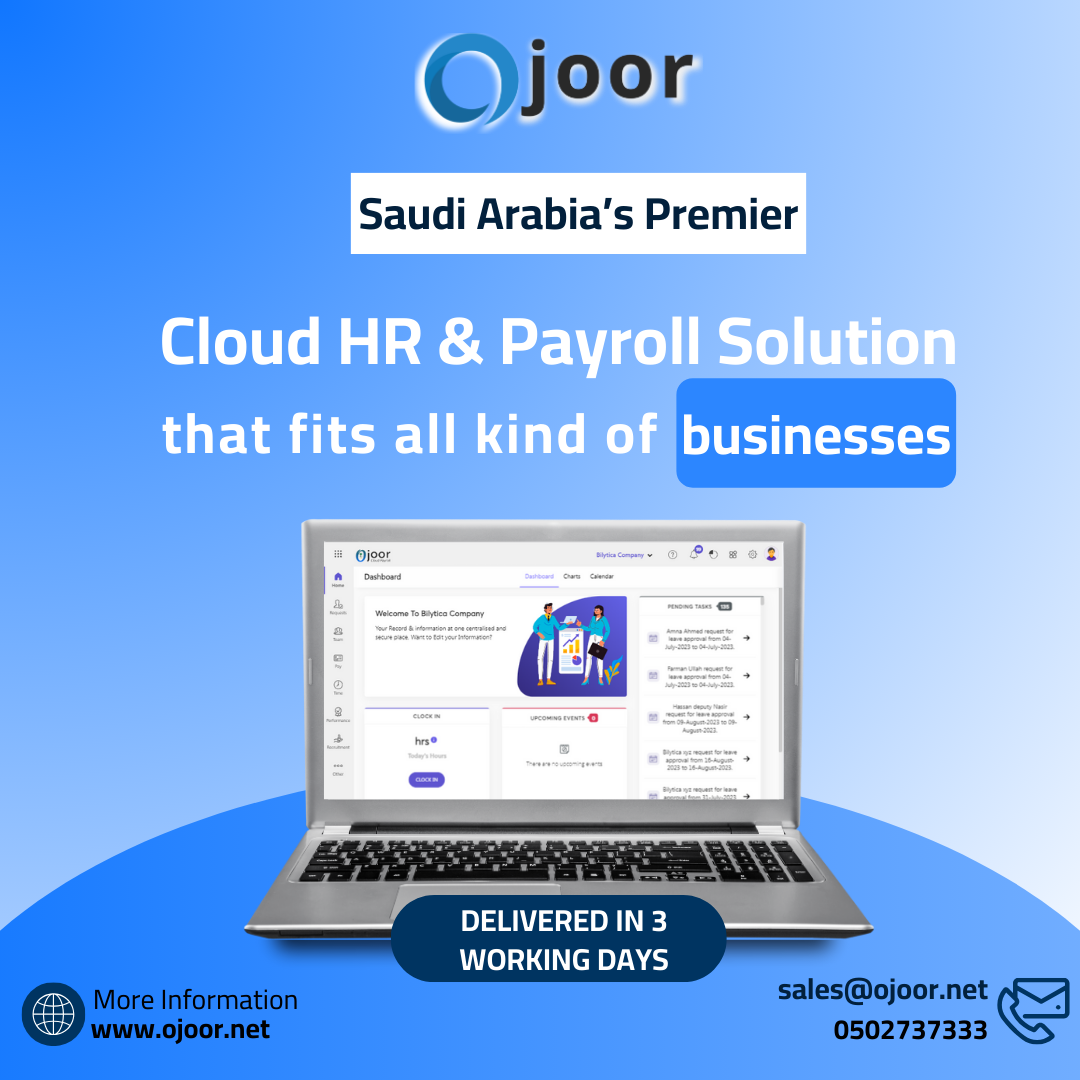
Ojoor # 1 is one of the top Employee management system in Saudi Arabia where businesses are increasingly adopting flexible work arrangements. Employee Management Systems (EMS) play a critical role in supporting remote work and virtual teams by providing tools and features that facilitate communication, collaboration, productivity, and management. This article explores how EMS supports remote work and virtual teams in Saudi Arabia, focusing on key functionalities, benefits, and best practices.


Effective communication is essential for remote teams to collaborate efficiently. Employee management system in Saudi Arabia platforms often include integrated communication tools such as messaging, video conferencing, and team collaboration features. These tools enable team members to stay connected, participate in virtual meetings, and collaborate on projects in real time. Features like chat rooms, discussion forums, and direct messaging ensure that communication remains streamlined and accessible regardless of team members’ locations.
Managing projects and tasks remotely requires robust project management capabilities. EMS platforms offer features such as task assignments, project tracking, and collaboration tools. These functionalities allow remote teams to set goals, track progress, and manage deadlines effectively. With features like shared workspaces, document management, and collaborative editing, team members can work together seamlessly on projects and tasks, irrespective of their physical locations.
Tracking time and monitoring productivity are essential for managing remote work. EMS platforms often include time-tracking features that enable employees to log their work hours, track time spent on specific tasks, and report on productivity. These tools provide managers with insights into employees’ work patterns and productivity levels, ensuring that remote teams stay accountable and aligned with organizational goals.
Self-service portals are vital for empowering remote employees to manage their own information and tasks. EMS platforms provide self-service features that allow employees to access and update their personal information, view pay stubs, request time off, and manage benefits. Self-service portals reduce the administrative burden on HR teams and provide remote employees with greater control over their employment-related tasks.
Access to HR services is crucial for remote employees who need support with various HR-related matters. EMS platforms offer remote access to HR services such as payroll management, benefits administration, and performance evaluations. Remote employees can access HR resources, submit requests, and receive assistance without needing to be physically present at the office. This ensures that HR support remains available and effective for all employees, regardless of their location.
Performance management is a key aspect of managing remote teams. EMS platforms provide tools for setting performance goals, conducting evaluations, and providing feedback. Features such as performance dashboards, goal tracking, and feedback mechanisms enable managers to assess employee performance, provide constructive feedback, and recognize achievements. These tools help ensure that remote employees remain engaged and motivated, contributing to their overall success and growth.
Ensuring the security and privacy of employee data is critical, especially for remote teams accessing systems from various locations. Employee management system in Saudi Arabia platforms implement robust security measures such as encryption, secure access controls, and authentication protocols to protect sensitive information. Features like role-based access, multi-factor authentication, and secure data storage help safeguard employee data and ensure compliance with data protection regulations.
Integration with other tools and systems enhances the functionality of EMS platforms for remote work. EMS platforms can integrate with productivity tools, communication platforms, and project management software to provide a seamless experience for remote teams. Integrations enable data sharing, synchronization, and automation, ensuring that all tools work together efficiently and enhancing overall productivity.

HR System in Saudi Arabia platforms provide the flexibility needed for remote work by offering tools and features that accommodate various work arrangements. Employees can access the system from anywhere, allowing them to work from home, co-working spaces, or other locations. This flexibility supports diverse work styles and helps organizations adapt to changing work environments.
Effective communication is crucial for remote teams to collaborate and stay connected. EMS platforms facilitate communication through integrated tools that enable real-time interaction, information sharing, and collaboration. By providing a centralized communication hub, EMS platforms help remote teams overcome geographical barriers and maintain strong connections.
Collaboration tools within EMS platforms streamline teamwork and project management. Remote teams can work together on shared projects, access and edit documents, and track progress in real-time. These features enhance collaboration, ensure that team members are aligned, and promote a cohesive work environment.
EMS platforms support productivity by providing tools for time tracking, task management, and performance monitoring. Remote employees can log their work hours, track their tasks, and receive feedback on their performance. By monitoring productivity levels and providing insights into work patterns, EMS platforms help organizations optimize remote work and achieve better results.
HR management becomes more efficient with an EMS that supports remote work. HR teams can manage employee records, process payroll, administer benefits, and handle other HR tasks from a centralized platform. Remote access to HR services ensures that employees receive timely support and that HR processes remain effective.
Engaging remote employees is essential for maintaining motivation and satisfaction. EMS platforms support employee engagement through features such as performance feedback, recognition programs, and self-service portals. By providing tools for goal setting, feedback, and career development, EMS platforms help remote employees feel valued and connected to the organization.
Ensuring compliance with data protection regulations and maintaining data security are critical for remote work. EMS platforms implement security measures and compliance features to protect employee data and meet legal requirements. By safeguarding sensitive information and ensuring secure access, EMS platforms help organizations mitigate risks and maintain trust.
As organizations grow and evolve, their remote work needs may change. EMS platforms offer scalability, allowing organizations to adjust their systems and processes to accommodate increased remote work volumes, new team structures, and evolving requirements. Scalable solutions ensure that the EMS remains effective and adaptable to organizational growth.
Selecting an EMS platform that meets the specific needs of remote work is crucial. Evaluate different platforms based on features, integrations, security measures, and scalability. Choose a system that aligns with your organization’s requirements and supports the functionalities needed for effective remote work.
Training employees on how to use the EMS platform effectively is essential for successful implementation. Offer training sessions, user guides, and support resources to help employees become familiar with the system. Provide ongoing support to address any issues and ensure that employees can use the platform efficiently.
Encourage a remote work culture that promotes communication, collaboration, and engagement. Use the EMS platform to facilitate virtual meetings, team-building activities, and social interactions. Foster an environment where remote employees feel connected and valued, even when working from different locations.
Regularly monitor the effectiveness of the EMS platform and its impact on remote work. Collect feedback from employees and managers to identify areas for improvement. Use analytics and performance metrics to assess the system’s performance and make adjustments as needed to optimize remote work processes.
Implement robust security measures to protect employee data and ensure compliance with regulations. Use encryption, access controls, and authentication protocols to safeguard sensitive information. Regularly review and update security policies to address emerging threats and maintain data protection.
Integrate the EMS platform with other tools and systems to enhance functionality and streamline workflows. Ensure that integrations are seamless and provide a cohesive experience for remote teams. Use integrations to automate processes, synchronize data, and improve overall efficiency.
Clear communication is essential for remote work success. Use the Payroll system in Saudi Arabia platform to facilitate communication, provide updates, and share information with remote teams. Ensure that employees have access to the information they need and encourage open communication channels.
Employee Management Systems (EMS) play a vital role in supporting remote work and virtual teams in Saudi Arabia. By offering features such as centralized communication tools, project management capabilities, time tracking, and self-service portals, EMS platforms enhance flexibility, productivity, and collaboration for remote employees. The benefits of using an EMS for remote work include improved communication, streamlined collaboration, efficient HR management, and enhanced employee engagement. By implementing best practices and leveraging the capabilities of an EMS, organizations can successfully manage remote work and virtual teams, ensuring a productive and cohesive work environment.

Employee management system in Saudi Arabia
Employee management system in Saudi Arabia
Employee management system in Saudi Arabia
[su_post field="post_title" default="" before="" after="" post_id="" post_type="post" filter=""] similar software solutions prices were updated on [current_date format='c'] in Saudi Arabia in Mecca, Medina, Riyadh, Khamis Mushait, Yanbu, Jeddah, Dammam, Unaizah, Uqair, Ha’il, Ta if, Al Bahah, Dhahran, King Abdullah Economic City, Najran, Diriyah, Qatif, Khafji, Jubail, Abqaiq, List of Cities and Towns in Saudi Arabia, Ras Tanura, Turubah, Jazan Economic City, Knowledge Economic City, Medina, Khobar, Abha, Tabuk, Saudi Arabia, similar software solutions prices were updated on [current_date format='c'] We also provide in Saudi Arabia services solutions company in Hafar Al-Batin, Udhailiyah, Al-Awamiyah, Hofuf, Hautat Sudair, Buraidah, Tayma, Duba, ‘uyayna, Saihat, Al-Kharj, Al-ula, Jizan, Rumailah, Ar Rass, Arar, Shaybah, Al Majma’ah, Rabigh, Dhurma, Haradh, List of Saudi Cities by Gdp Per Capita, Badr, Sudair Industrial City, Baljurashi, Shaqraa, Al-Khutt, Habala, Ad Dawadimi, Dawadmi, Layla, similar software solutions prices were updated on [current_date format='c'] Price is SAR 100 and this was updated on updated on [current_date format='c'] similar [su_post field="post_title" default="" before="" after="" post_id="" post_type="post" filter=""] software solutions prices were updated on [current_date format='c'] in Saudi Arabia in Haql, Afif, Al-Abwa, Farasan, Al-Jaroudiya, Thadig, Al-Thuqbah, Al Wajh, Almardmah, Al-Zilfi, Muzahmiyya, Prince Abdul Aziz Bin Mousaed Economic City, Tharmada’a, Skaka, Um Al-Sahek, Sharurah, Tanomah, Bisha, Dahaban, Al Qunfudhah, Qurayyat, Saudi Arabia, Ha’ir, as Sulayyil, Al Lith, Turaif, Al-Gway’iyyah, Samtah, Wadi Ad-Dawasir, Az Zaimah, Safwa City, Jalajil, Harmah, Mastoorah, Hotat Bani Tamim, Jabal Umm Al Ru’us, Rafha, Qaisumah, Al-Ghat, Hajrah, Al-Hareeq. Excerpt: Jeddah (also spelled Jiddah, Jidda, or Jedda; Arabic: Jidda) is a Saudi Arabian city located on the coast of the Red Sea and is the major urban center of western Saudi Arabia similar software solutions prices were updated on [current_date format='c'] Price is SAR 100 and this was updated on updated on [current_date format='c']
8-6-2024